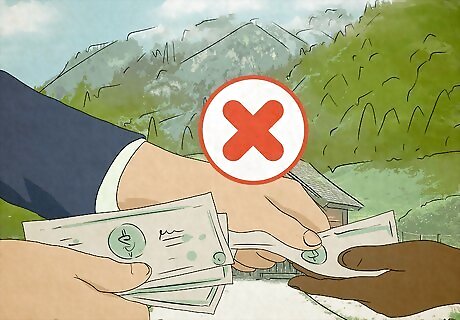
views
- Read your contract and deed carefully before trying to sell your timeshare.
- If you own the property, contact a real estate agent with experience selling timeshares.
- Never pay up front. If you use an exit company or agent, they should collect payment at the end.
Read your contract thoroughly.

The deal you signed probably outlines your easiest option. There’s no such thing as a timeshare you can’t get out of, regardless of what your contract says. If the resort is reasonable, they may have provisions in the contract for selling your unit or account back to them. Following the resort’s steps is probably the fastest and easiest way to move on. Often, resorts have a “deed-back” program where you sell your timeshare back to the developer. Unfortunately, your sales price will rarely add up to much. A lot of timeshare contracts will mention that it’s “non-cancellable” or something like that. It’s not true. Like any legal contract, there are ways to void the contract, so don’t worry. If your timeshare isn’t paid off yet, you’re probably going to have to pay the balance off before you can sell the unit or account.
Look at the deed if you have one.

This process changes dramatically if you actually own the property. If you don’t have a deed, you’re actually not selling a property—you’re selling an account. Unfortunately, these accounts aren’t worth much. However, if you do have a deed, you own actual property that may be worth a fair bit. Read your deed or contract to determine if you’ve only got the “right to use” the property. Locate the physical deed/contract if you have one. Do you own a timeshare at a resort that resembles a hotel? If so, you likely only own an account attached to a lease and have the right to use it. If the property is a standalone home, you probably own the land. We’re going to be straight with you—there isn’t much of a market for timeshare accounts. You may not be able to make any money on the sale.
Determine your timeshare’s value.

Look up the price for comparable units in the area. If the building has other timeshares with identical ownership structures available, look at the listings to see what they’re going for. Then, look at timeshares in other nearby buildings to see what they’re selling for (taking whether the land is for sale into account). This should give you a sense for how much your timeshare is worth. Timeshares usually go down in value over time, so it may not be realistic to expect to get what you paid for. If you’re selling an account with points on it, make sure that they’re transferable before you take them into consideration. If you don’t own the deed to the land, don’t treat listings for actual land like they’re comparable. If you’re totally lost, try using Red Week’s timeshare price searching tool.
If you own the property:

Contact a real estate agent to sell the property for you. This isn’t a good time to enlist the help of a relative who just got their real estate license. Timeshare transactions can be complicated, and you really need someone in your corner who has experience selling timeshares. Find a reputable, qualified agent and let them run the show. Do not pay the agent up front. Real estate agents should only collect commission after the deal is done. If a potential agent wants money up front, they’re probably not worth hiring.
If you don’t own the property:

Hire a timeshare exit company to get you out of the contract. Reputable exit companies specialize in helping timeshare owners get out of accounts they no longer need. Find a no-fee exit company and let them work their magic. They’ll get you out of the timeshare. Never pay fees or pay for service up front. Reputable timeshare exit companies will only take payment by subtracting a cut of the sales price. A good exit company won’t try to pressure you into signing anything or You can tell an exit company is reputable and honest if they’re realistic about how long this will take. Getting out of a timeshare contract should take 6-18 months.
Ask the resort to sell your timeshare.

Even if your contract is ironclad, the resort may sell it for you. If the demand for units with your company is high, there’s no reason they wouldn’t take the opportunity to resell your timeshare for a higher price. Call the timeshare company and ask to speak to the manager. Explain your situation and see if they’d be interested in selling your account or timeshare lease. Don’t talk to a salesperson about this. They’ll just try to upcharge you or trick you into “upgrading” to another unit. Just don’t offer to pay for anything and you’ll be fine. The salespeople work on commissions, so they’ll try to sell you on things you don’t need. The managers are the only people with the power to connect you with the people you’ll need to talk to get out of the timeshare.
Trade, rent, or sell your unit on TUG.

TUG, the Timeshare Users Group, is a great resource for you. TUG is the biggest online forum for timeshare users. Sign up for an account and list your unit on the marketplace for sale. Alternatively, if you haven’t considered it, you can rent the timeshare out on TUG or trade properties with another timeshare owner! This is a great option if you’re simply looking for a change of pace and you’re tired of the current timeshare. It costs $15 to join the Timeshare Users Group, but it’s well worth the minor cost according to timeshare owners online. Only use the .net site. There is a TUG2.com, but it’s unclear if this is a legitimate or helpful site. You can try renting the timeshare on Airbnb, but most timeshare contracts include bans on Airbnb for competition reasons.
Sell the timeshare on eBay.

If you’re okay with letting it go for cheap, eBay is a great option. As weird as it sounds, eBay has turned into the nexus for timeshare sales. If you cannot sell it via traditional means, just list the unit on eBay. You can either allow people to bid on it, or list it for a price you’d be willing to part with. Include photos of the unit, the timeslot you have, and any other relevant information. When you sell your timeshare on eBay, contact the timeshare company and give them the details of the buyer. They’ll provide the closing documents you need to transfer your timeshare. If you go on eBay right now and look at the timeshare listings, you’ll see a ton of timeshares for $1.00. Depending on the demand for your timeshare, you may need to let it go for very little.
Give the timeshare away.

If there’s no market for your timeshare, you might have to give it away for free. Timeshares come with all kinds of maintenance costs and yearly fees, and the companies who sell and manage timeshares don’t have a particularly great reputation. As a result, you may not be able to sell it to anybody. But that doesn’t mean you can’t give it away to someone. Post in a local Facebook group or reach out to friends and family members to see if anyone wants your unit. In extreme cases, if you still can’t get the unit off your hands, you may need to offer to cover a year of maintenance fees or something along those lines to incentivize someone to take the unit.
Hire a lawyer if they won’t let you go.

Timeshare companies will usually give up if you put up a legal fight. It’s usually not worth it for timeshare companies to fight in court over leases that often only net a few thousand a year, so reach out to a law firm. If possible, find a lawyer with experience tackling timeshare contracts. They’ll either find a loophole in the contract to get you out it, or negotiate with the timeshare company to reach an amicable agreement. If you can’t afford a lawyer, consult your state’s legal assistance programs. You’ll probably be able to find a lawyer to work for you pro bono.
Never pay upfront fees.

There are a lot of timeshare reselling scams, so don’t pay for anything. You’re selling the asset here, so whoever is helping you out should be taking their cut at the end of the day, not at the start of the process. Do not give anybody any money before the unit is sold—they’re either scamming you, or they’re trying to get paid without doing any work. You may need to pay a lawyer, real estate agent, or exit company at the end after you’ve sold the timeshare, but that’s after the deal is done.
Don’t let sales folk scare you.

Timeshare salespeople will try to pressure you into paying more. Look, timeshare sales reps are not particularly pleasant or pressure-free folks to be around. They get paid to push kind and pleasant people into paying for things they don’t need. As irritating as they can be, don’t let them scare you into paying for something you don’t want.



















Comments
0 comment